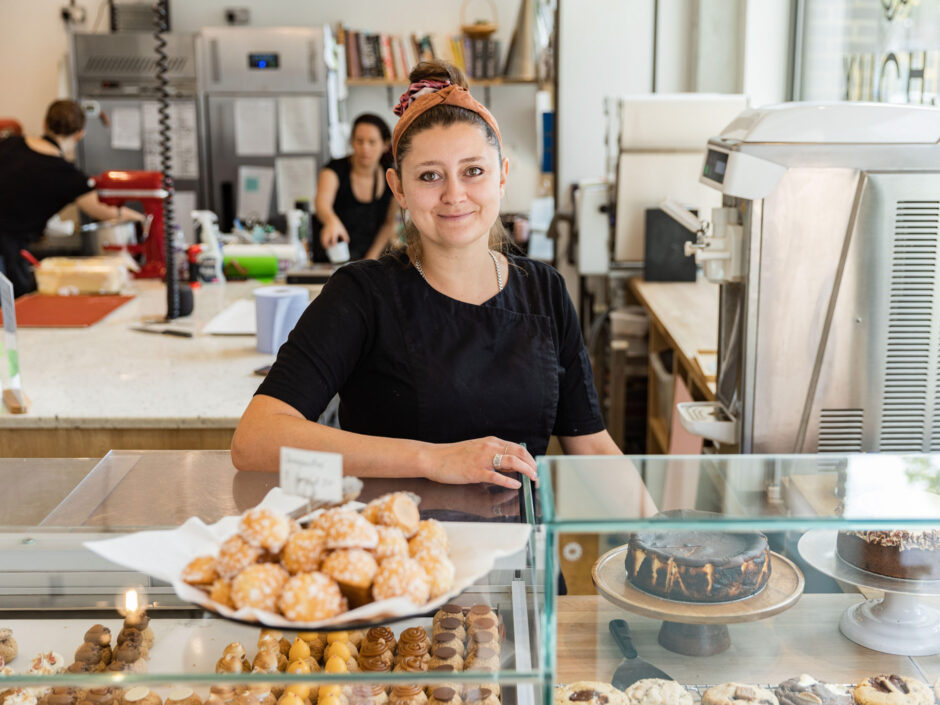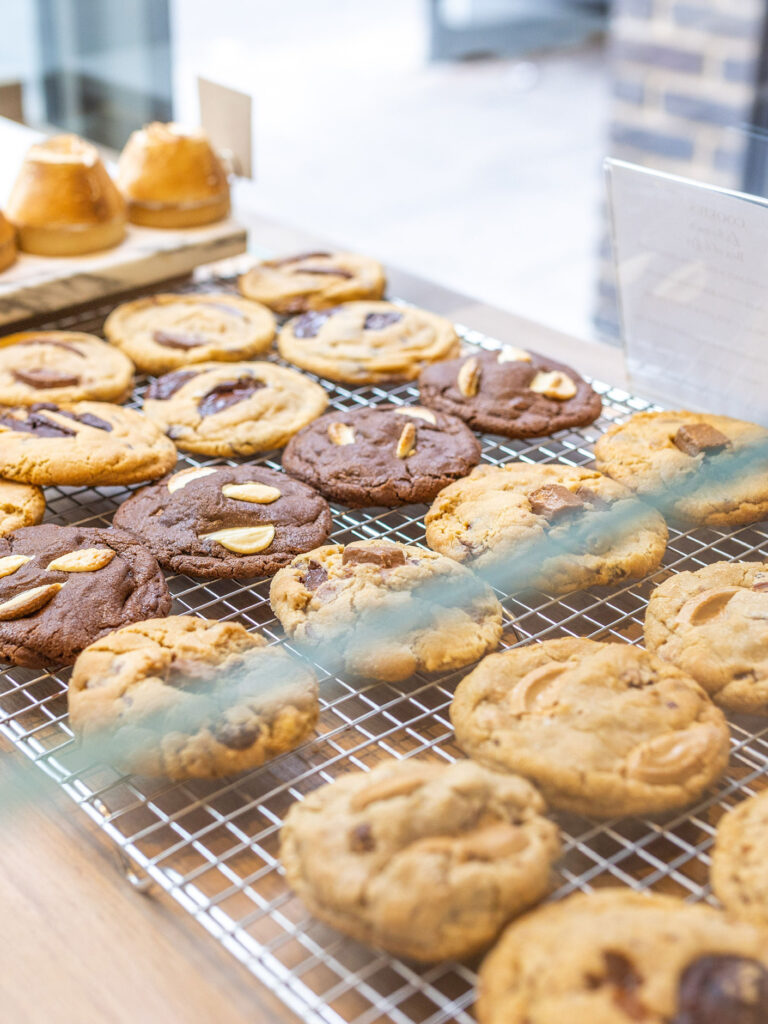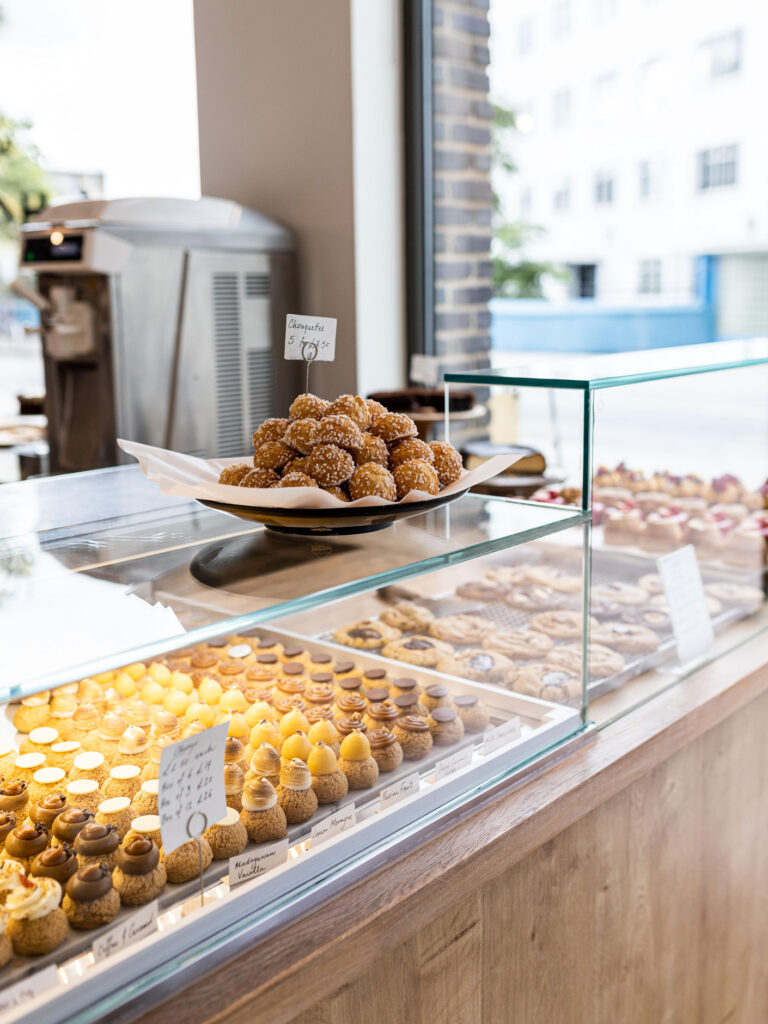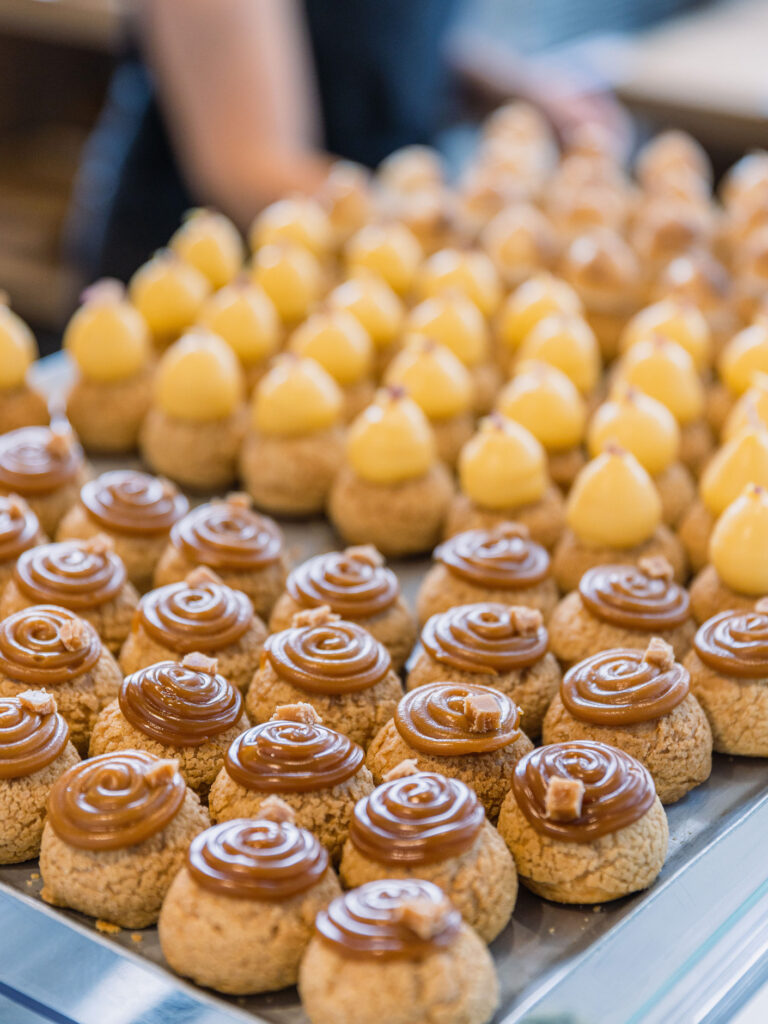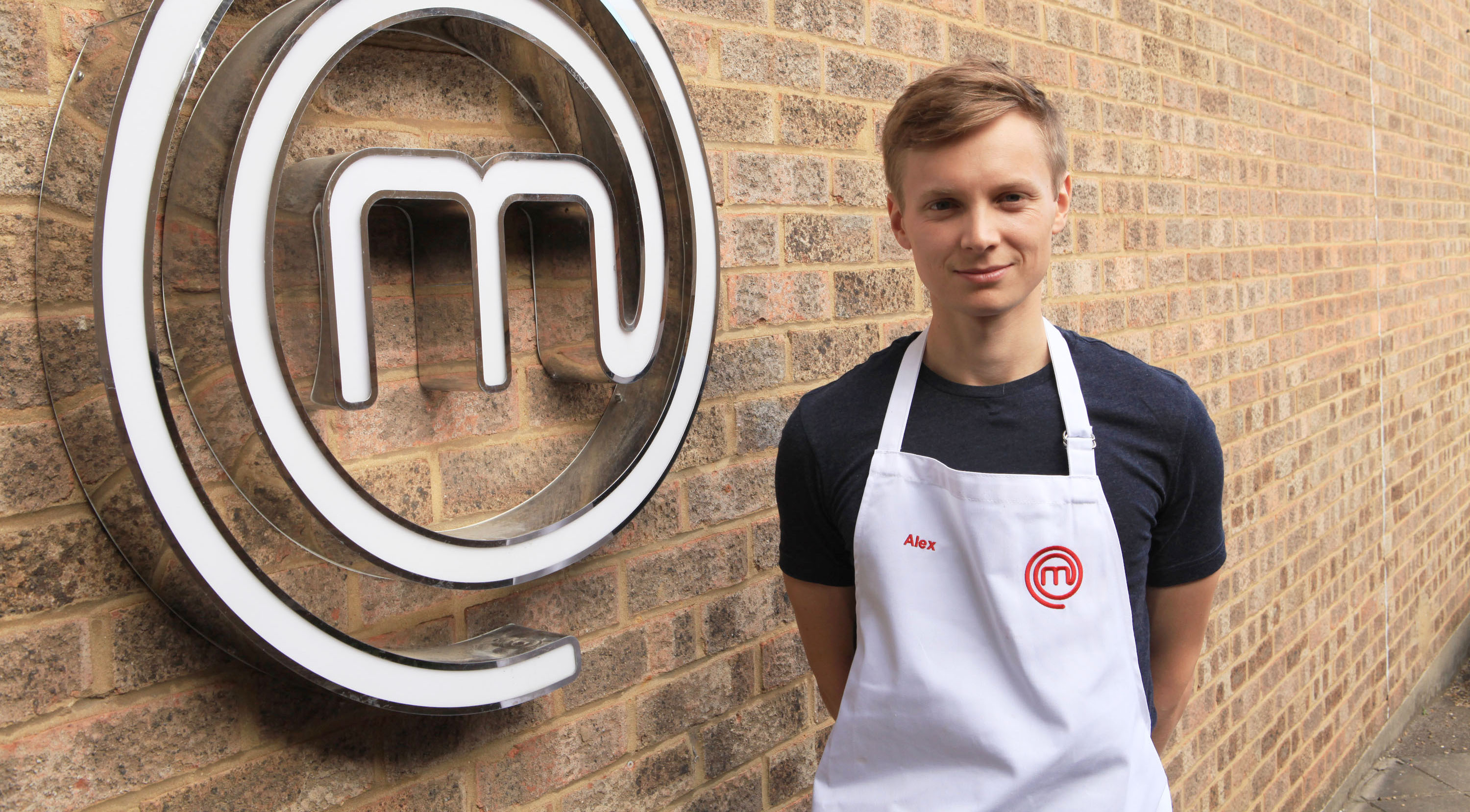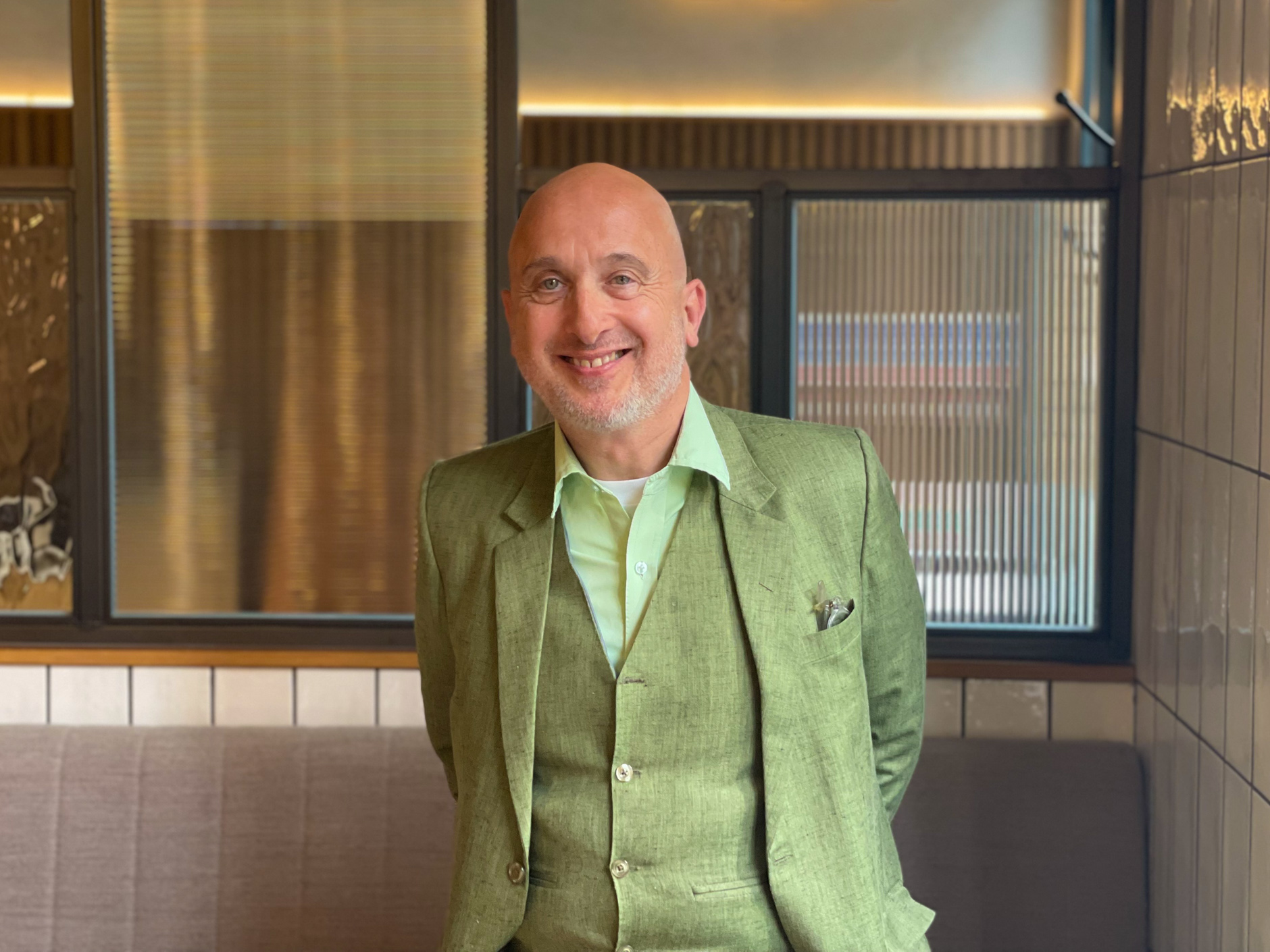Abigail Scheuer trained at the prestigious Hotel Plaza Athénée in Paris, under the direction of culinary master Alain Ducasse, played host to pop-ups and events around London together with KERB, before opening her own ambitious French patisserie shop on Ladbroke Grove. Le Choux is female-led, with an airy open kitchen where you can watch the team create tiny, perfectly formed choux buns, as well as delicious cookies (a nod to Scheuer’s mixed French-British heritage). Palate contributing writer Siobhan Gunner (SG) spoke to Abigail (AS) about working in hospitality and her mission to bring Parisian magic to London.
SG: How did your experience at Paris’ prestigious Plaza Athénée, followed by kitchens in London, shape the kind of kitchen environment you wanted for Le Choux?
AS: Being amongst the top, top pastry chefs in Paris, Le Plaza Athénée set the bar incredibly high for the standards and quality that I wanted for Le Choux. It was a strict and undeniably passionate – yet always collaborative – kitchen space to work. Back in London, [working in basement kitchens] I ended up feeling extremely depressed – the standards weren’t nearly as high, it was male-dominated and an all-round stressful, unpleasant place to be working as a young female pastry chef.
There were regular degrading comments flying through the kitchen; not what you want to be receiving at work (or anywhere). Before service, the head chef would go round shaking every single one’s hand, except for the women – something I’d never experienced before, because in Paris both male and female pastry chefs are treated with equal respect. So for Le Choux, I knew I wanted to create a kitchen environment of the similar high, respectable standard as Le Plaza Athénée, but female-led – where collaboration and a mutual love for baking drives the business, rather than a power hungry force.
SG: Was the open-plan kitchen space on Ladbroke Grove another result of that, or driven by wanting to provide a more interactive and theatrical customer experience?
AS: Both. When I was working in basement kitchens, there was a real disconnect between the person eating the pastry and the chef who has spent hours meticulously creating the pastry from scratch. There is no opportunity to learn from the customer journey, but with an interactive, open-plan kitchen space like we have on Ladbroke Grove, that boundary is a little more blurred. It’s also helped massively with the team’s mental well-being – having these huge, high-ceilinged windows and seeing a customer’s face light up has completely transformed how we feel.
Once you’ve finally perfected your choux pastry recipe, it opens the doors to so many beautiful, quintessential French desserts. It’s the epitome of French patisserie and one that still fascinates me, even now
SG: Choux pastry, or pâte à choux, is unsurprisingly at the forefront of Le Choux’ s baking – why did you choose this particular French pastry?
AS: Growing up with a French mother, our family would always have a once-a-year trip to France, including Paris, and my favourite pastry of all time was either a chocolate or coffee éclair. Its distinctive oblong shape, the soft cream inside, the sweet, mirror-shiny fondant on top, I found it completely fascinating as a kid.
Choux pastries then became something I often whipped up at dinner parties for friends and family, and – being quite good at it and plotting my own pastry business – my sister’s now-husband said, ‘Why don’t you start with choux’, which made sense. There wasn’t anybody else in London specialising in choux, and it was something I could easily do myself, without needing too much equipment.
SG: Easily?
AS: Well, I realise now in theory they’re not that easy to make – just something I was relatively good at. But once you’ve finally perfected your choux pastry recipe, it opens the doors to so many beautiful, quintessential French desserts – croquembouche, Paris-Brest, Gougères and of course, the ever wonderful éclair. It’s the epitome of French patisserie and one that still fascinates me, even now.
SG: How did the cookies end up joining the menu?
AS: While I have fond memories of those French family holidays and an in-born affection (and complete appreciation) towards expertly crafted, high-quality Parisian pastries, I still grew up in London, where cookies became my ultimate post-school treat. Whenever I had the chance, thirteen-year-old me would head over to M&S and bag up a deliciously cheap and simple milk chocolate chunk cookie.
My mixed French-British heritage has translated to Le Choux’ s menu: the pastries are an ode to the perplexingly perfect patisseries in Paris, and the cookies a nostalgic nod to that comfortingly soft and chewy (and preferably still-warm) cookie.
SG: The rich, transformative aroma of chocolate and butter in your shop is incredible – can you tell us more about the sourcing of your ingredients?
AS: We use high-quality, unsalted French butter, my favourite Cacklebean eggs with their gorgeous, almost orange-coloured yolks, and the finest Estate Dairy for the creamy choux fillings. Chocolate is Luker, a proper sustainable and ethical cocoa maker run by the same Colombian family since 1900, as well as French Valrhona.
SG: Do you think there has been a shift from using Valhrona, once regarded as the elite chocolate choice in pastry kitchens, to more sustainable bean-to-bar makers, such as Luker and Original Beans?
AS: Yes, definitely. There are some incredible small-scale chocolate makers out there – Islands Chocolate, Original Beans, Pump Street to name a few – leading the way for a more sustainable and fair market consumption, but Valhrona does offer reliability, variety and somewhat more ease as they have a whole dedicated lab where trained chefs test how each of their chocolates performs in patisserie baking.
SG: Choosing these ingredients and creating a sustainable work environment comes at a cost, paired with London’s soaring-high rents and inflation this certainly can’t be easy. How have these factors affected Le Choux?
AS: I chose this off-the-beaten track location on Ladbroke Grove because the rent was low; if I’d been paying an extremely high rent from the start, I would have struggled a lot more. Our profits have been affected since the price of ingredients, inflation and electricity has peaked, so inevitably that has cut into our margins, which in hospitality is already incredibly tight. As a result, we’ve had to increase our pricing and put our eggs in quite a few baskets. While the shop doesn’t offer the opportunity to sit-in, we maximise every single space in the kitchen to make pastries for bespoke events, delivery, pre-orders as well as the impromptu walk-ins.
SG: I recently read customer complaints in restaurants regarding pricing seem more prevalent towards cold dishes, whereas these in fact act as a buffer to pay an acceptable price for other things on the menu (i.e. cooked dishes that contain more complicated sauces or sustainably sourced meat). Do you think, as a baking business offering mainly “cold” day-time luxuries, you’re already more disadvantaged?
AS: I don’t think we’re disadvantaged because restaurants pay a lot more in service, and there’s a huge amount of cost implications in running a restaurant that there isn’t in a takeaway pastry shop. On cold food, you don’t pay VAT, so that’s a 20% tax we don’t pay, which makes the business a little bit more cost-effective to sustain.
SG: Similarly, people seem happy to splurge on booze but baked goods with a similar price tag cause a certain resistance – why do you think that is?
AS: I think people are quick to spend money on booze because they see it as a social thing – it’s a luxury, it’s an experience, it’s relaxed networking – whereas pastries don’t naturally carry that important sociable factor. However, in France, properly made high-quality pastries and breads are a very big part of everyday life. In a similar way you would buy a nice bottle of wine to take to friends and family, you would also pick up a box of pastries – it’s instilled in French culture. And I do think social media, and other creative outlets that increasingly put the spotlight on pastry chefs, is really helping to bring awareness to the amount of work that goes into producing luxury, high-quality baked goods. Especially since COVID, eating and sharing these little, delicious pastry luxuries are met with a lot more positivity.
SG: Have you dealt with customer complaints yourself, regarding pricing?
AS: The occasional customer will come in, saying ‘Why am I paying £3 for one cookie when I can get five for £3 in Sainsbury’s down the road’. Of course, they’re more than welcome to go to Sainsbury’s but this is a completely different product. It’s hand-made, we use wonderful, fresh, locally sourced ingredients, following recipes that I have spent a long, long time perfecting.
SG: When you’re not knee-deep in butter and chocolate at Le Choux, which independently run restaurants and bakeries in London do you like supporting most?
AS: It takes one skill to be a pastry chef, and another skill to open a business, so I get unbelievably excited witnessing my pastry chef friends opening up their own place. And despite the current tough climate, there’s been an influx of brilliant new bakeries lately – EK bakery (a Saturday-only celebration of layer cakes and fun, internationally-inflected brownies just behind Broadway Market), Cakes ‘n’ Layers (the latter part of the name hints to the phenomenal laminated pastries on offer, set in Greenwich) and Maya’s Bakehouse, Brixton’s much-loved micro bakery gone brick-and-mortar. For dinner or brunch, I would head to Harvest, which is a new, seasonally-focused modern British restaurant from the same team behind Parlour.
SG: And in Paris?
AS: Paris has double the amount of restaurants, pastry and chocolate shops, but half the population compared to London – meaning it’s nearly impossible to narrow down. But a weekend roaming around the Parisian streets would have to include Benoît Castel, known for using hyper-local, beautifully seasonal ingredients, Jeffrey Cagnes’, where you’ll find sweeping éclair towers that inspired our own choux towers, and the rustic, reliably tasty pastries of female-led Mamiche boulangerie.
SG: Finally, choux or cookie?
AS: I try not to eat them too much, but probably do eat one every other day – our coffee mascarpone choux, with a soft caramel heart.
Le Choux is located at 332 Ladbroke Grove, London, W10 5AH and you can follow them on Instagram @lechouxlondon.
Photos kindly provided by Abigail Scheuer and reproduced with her permission.
October 2023.

